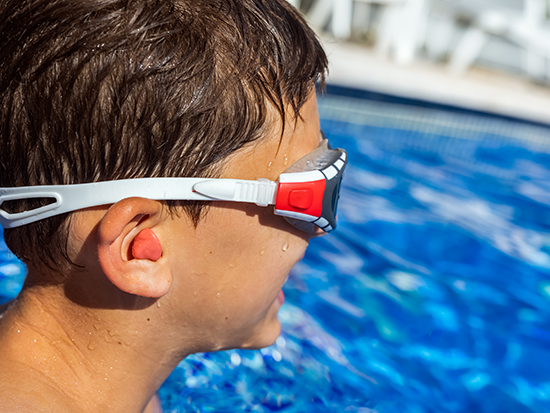 Bacterial otitis externa, more commonly known as swimmer’s ear, is an infection of the outer ear caused by bacteria. Pools, barbeques, lake days and beach weekends — it is the soundtrack of summer. While swimming is a great way to stay cool in the sweltering heat, the continuous introduction of water to ears can lead to a summer afternoon in the doctor’s office.
Bacterial otitis externa, more commonly known as swimmer’s ear, is an infection of the outer ear caused by bacteria. Pools, barbeques, lake days and beach weekends — it is the soundtrack of summer. While swimming is a great way to stay cool in the sweltering heat, the continuous introduction of water to ears can lead to a summer afternoon in the doctor’s office.
Bacterial otitis externa, more commonly known as swimmer’s ear, is an infection of the outer ear caused by bacteria. One University of Alabama at Birmingham expert explains how to prevent and treat swimmer’s ear this summer.
Prevention
Erika McCarty Walsh, M.D., director of the UAB Division of Otology and Neurotology, says the best way to prevent swimmer’s ear is obvious.
“The best prevention tool is to keep your ears dry and free of moisture,” Walsh said. “Parents can find ear plugs or headbands that can help keep children’s ears nice and dry while they’re swimming. Make sure to keep the ears clear of manipulation from fingertips or cotton swabs.”
When it comes to swimming in different bodies of water, Walsh says that untreated water — such as lake or seawater — may contain more micro-organisms than treated water, which can lead to an infection. However, people of all ages may be predisposed to swimmer’s ear no matter what kind of water they are in.
“A common misconception is that only young children can get swimmer’s ear, but this is not true,” Walsh said. “Adults and adolescents alike can get this infection.”
Treatment
Walsh says there are some home remedies that can be used to treat swimmer’s ear. These can include over-the-counter ear drops found at a local drug store.
“While these medicated drops can help a mild case of swimmer’s ear, if there is a true case of a bacterial outer ear infection, it is best to be evaluated by a health care provider so that it can be treated with antibiotic drops,” Walsh said.
Common symptoms of swimmer’s ear include:
- Pain, which can be severe even with gentle movement of the pinna (outer ear)
- A clogged sensation
- Hearing loss
- Discharge that can vary from clear, yellow or white
Walsh recommends patients seek medical attention if they experience worsening ear pain, drainage from the ear or hearing loss.
“Remember, the best treatment is prevention,” Walsh said.
Clickhere to find a UAB Medicine ENT provider and schedule an appointment.